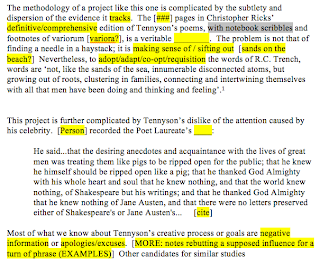This is a topic that has been coming up a lot lately in everything from online videos to social research to opinion pieces, but to restate the case: social media create environments in which it's very easy to see the glossy surfaces of other people's (apparently) near-perfect lives. As a net result, researchers tell us, things like facebook actually make us feel sadder, more alone, and less accomplished. I'd like to point out that it's not entirely because people consciously construct a braggy version of their lives to show off. In a very good online essay (
see here), someone drew a Venn diagram* about facebook posts. One circle was things that matter to the poster and one was things that benefit the reader (a funny link, etc.). An ideal post covers both, whereas purely selfish posts -- either too positive or too negative -- are annoying. Consequently, we try to strike a happy balance; something good happened, but be self-depricating about it; or you're having a rotten day, but express it in slightly cartoonish terms of dismay.
*Did you know Venn was a Cambridge alumnus and compiled a massive list of all known alumni from the beginning of the university to his own time? He was at the college next door, Gonville and Caius.
 |
Our folders are pretty on the front
and completely impractical to use
in performance. I may donate money
someday just to get functional ones. |
This self-evident truth -- that we're broadcasting curated, polished versions of our lives -- was brought home to me when I was catching up with hometown friends in August. When I expressed some anxiety about being behind on certain landmarks of adulthood (they're mostly getting married and/or buying houses), they pointed out that based on my online presence, my life is the envy of everyone back home, friends who are perhaps working uninspiring jobs, who have precious few occasions to wear black tie, much less eat a formal dinner twice a week. It came as rather a shock to them when I said that I'd been miserable most of last year. Because I didn't post pictures of myself sobbing on my co-captain's shoulder (literally) or the nasty note someone wrote on my dinner program out of childish spite. Why would I? Let's just say that it was very therapeutic to delete hundreds of emails this summer and distance myself from the stressful year they represented. No one who had a conversation with me during the last 12 months escaped hearing the truth of my situation, but those who only viewed from a distance had no clue.
In short, I hope that I haven't been too happy-slappy on this blog, but to the extent that I have given a false impression of my 'perfect and fabulous life', I apologize. On the other hand, my mom reads these posts (hi, Mom!), so I can't say I'll be unleashing the full force of suckage when things are going badly. But I'll try to be honest about the ups and downs.
One major up recently was the chapel choir's tour to Brittany in northwestern France during the last week of August. One enterprising member of choir created a Twitter feed for the occasion; it's @TrinHallCC if you're into that kind of thing. It will continue to be our feed as the year progresses, and even non-Twitter folks can follow it here: https://twitter.com/TrinHallCC/
 |
| Trinity Hall chapel |
The trip was great for group bonding, and I found it pretty exciting musically. You see, we normally sing in the smallest chapel in Cambridge (or Oxford, for that matter). It's a "dry" space, meaning basically no echo. It's a bit like singing in a closet. I actually love our chapel, but suddenly we were singing into big, stone churches where the sound lasted for many seconds after we stopped singing, and our voices blended into a whole new thing. It's incredible what our director accomplishes with twenty-odd people, none of whom have perfect pitch!
I've put together a little video to go with a recording of one song from our first concert. It's beautifully heartrending, yearning music. Here are the words:
Thou knowest, Lord, the secrets of our hearts.
Shut not, shut not thy merciful ears unto our prayer,
But spare us, Lord. Spare us, Lord most holy.
Oh God! Oh God most mighty,
Oh holy and most merciful savior,
Thou most worthy judge eternal,
Suffer us not, suffer not at our last hour
For any pains of death, for any pains of death
To fall, to fall from thee. Amen.























